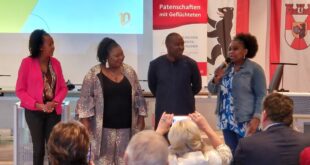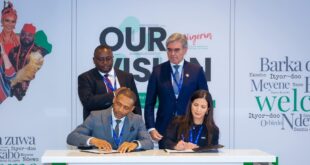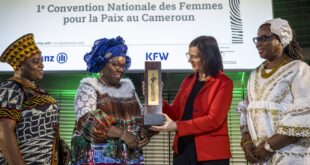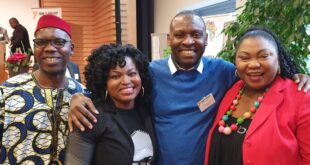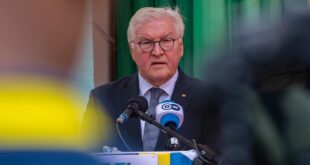How to make African women more visible as entrepreneurs and not only as employees in Germany was the theme of the 10th Economic Forum of the Pan-African Women’s Day, which took place on Friday, 26 July at the Chamber of Commerce (IHK) in Potsdam, Germany. The Day (celebrated each year on 31 August) is also a contribution to the UN Decade for People of African Descent.
Chief guest speaker was Dr Pierrette Herzberger-Fofana, a member of the European Parliament. In her speech, the Green Party member encouraged African women to more participation in society.
The MP, a veteran of African community organisation, thanked the organisers, Pan African Women’s Empowerment & Liberation Organisation (PAWLO)-Germany, for inviting her to the event and she considered the invitation a recognition and appreciation of her efforts for people of African descent in the country.
Ms Herzberger-Fofana, who is a co-founder of the umbrella body of organizations representing women migrants in Germany (DaMigra), was the immediate past vice president of the Central Council of African Communities in Germany (Zentralrat der Afrikanischen Gemeinde in Deutschland e.V.). Until her election into the European Parliament in May 2019, she was also a Councillor in the town of Erlangen, state of Bavaria.
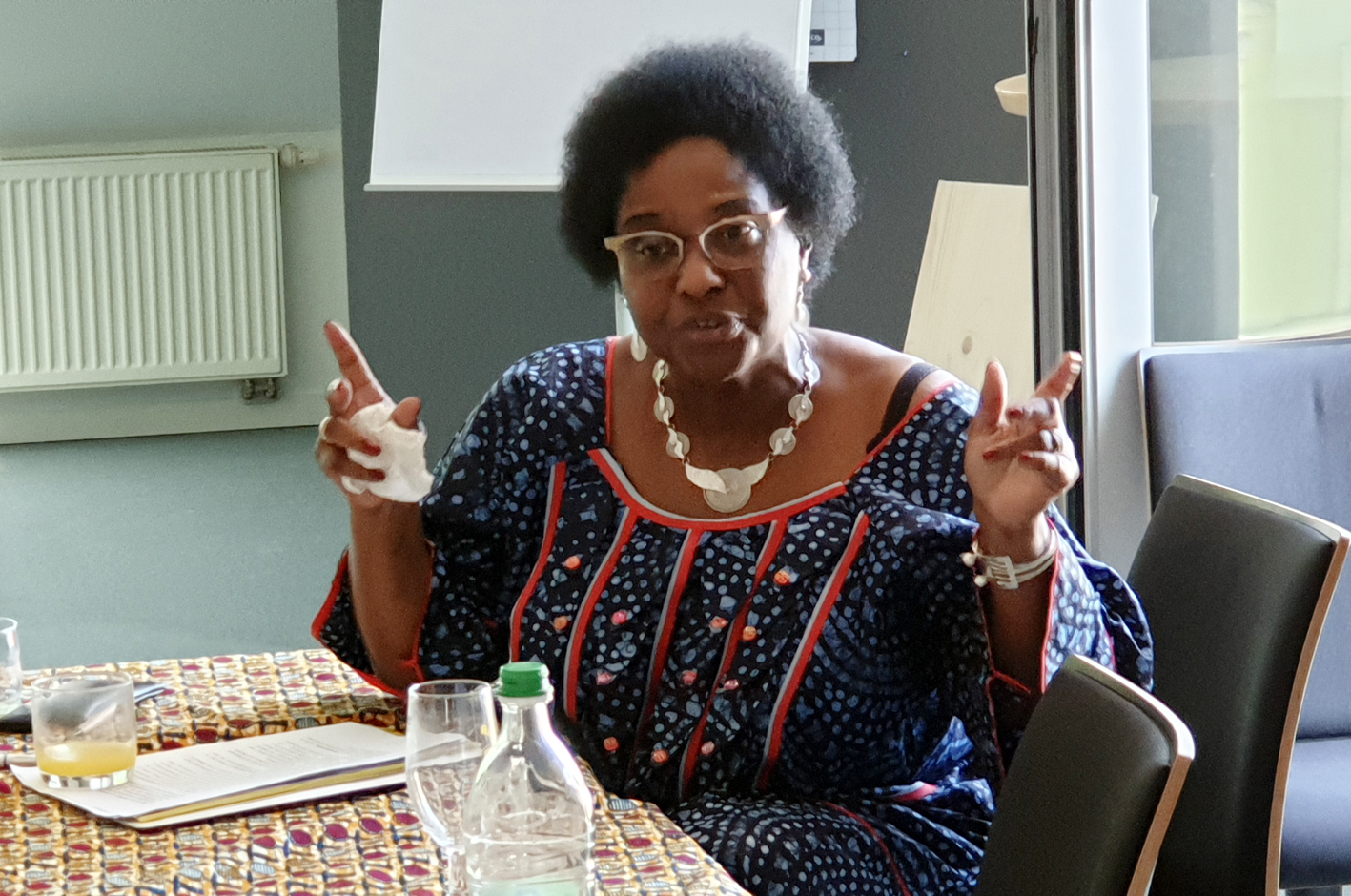
The European Parliamentarian assured that elected politicians of African origin were committed to the improvement of the situation of Africans in Germany.
She talked about a new group in which she’s involved, Elected Officials of African Descent in Germany (Mandatsträger und Mandatsträgerinnen afrikanischer Herkunft in Deutschland), which is chaired by the Bremen state legislator Elombo Bolayela. She is the vice chairman of the body, which seeks to promote issues concerning Africa and Africans in their respective spheres of influence.
Changing the image of the African woman
Ms Herzberger-Fofana illustrated her vision of the African woman entrepreneur in Germany with a placard showing a business savvy woman with a mobile phone in one hand, appointment diary in the other and a laptop on her laps!
Fofana-Herzberger said it’s an image that challenges society’s stereotypical impression of African women as an underclass of an already disadvantaged group. “The image of the African woman in the popular mind is that of an oppressed person without rights. This distorted image of the African woman should be corrected,” she said.

The MP said the strengths and competencies of African women should be emphasised and brought to the fore and they should be empowered to deploy these resources through projects and initiatives.
Need for equal partnership
As a politician active in international development co-operation, the European parliamentarian said the EU says that it seeks a dialogue of equal partners in its dealings with Africans.
“The relations between the EU and Africa are not on the basis of equal partnership because the Europeans pursue a policy of trade liberalisation which is not in the interest of Africa because it’s damaging to emerging economies,” she noted.
“Africa is the source of important raw materials for the industries of the world but does not derive the economic benefits due to it from the trade in these resources,” she added. “Without coltan from the Congo, there is no smart phone,” the MP reminded her audience.
Herzberger-Fofana said trade relations between the two continents were not fairly structured. “It’s not a secret that the prosperity of Europe is historically founded on its exploitation of the Africa continent,” she added.
Forum for overcoming challenges
In her opening remarks, Marianne Ballé Moudoumbou, Coordinator of the PAWLO-Germany, went down memory lane to the beginning of Pan African Women’s Day in Germany, which was marked for the first time in 2008 up to the campaign for the full implementation of the Durban Declaration and Plan of Action (DDPA) from the 2001 World Conference Against Racism (WCAR) and the cooperation with Afrika WirtschaftsForum (AfWiFo).
It was the recognition that African female entrepreneurs faced challenges setting themselves up in Germany that led to the founding of the AfWiFo – an economic forum for African entrepreneurs and Entrepreneurs of African descent, whose objective it’s to discuss these challenges and how to overcome them.
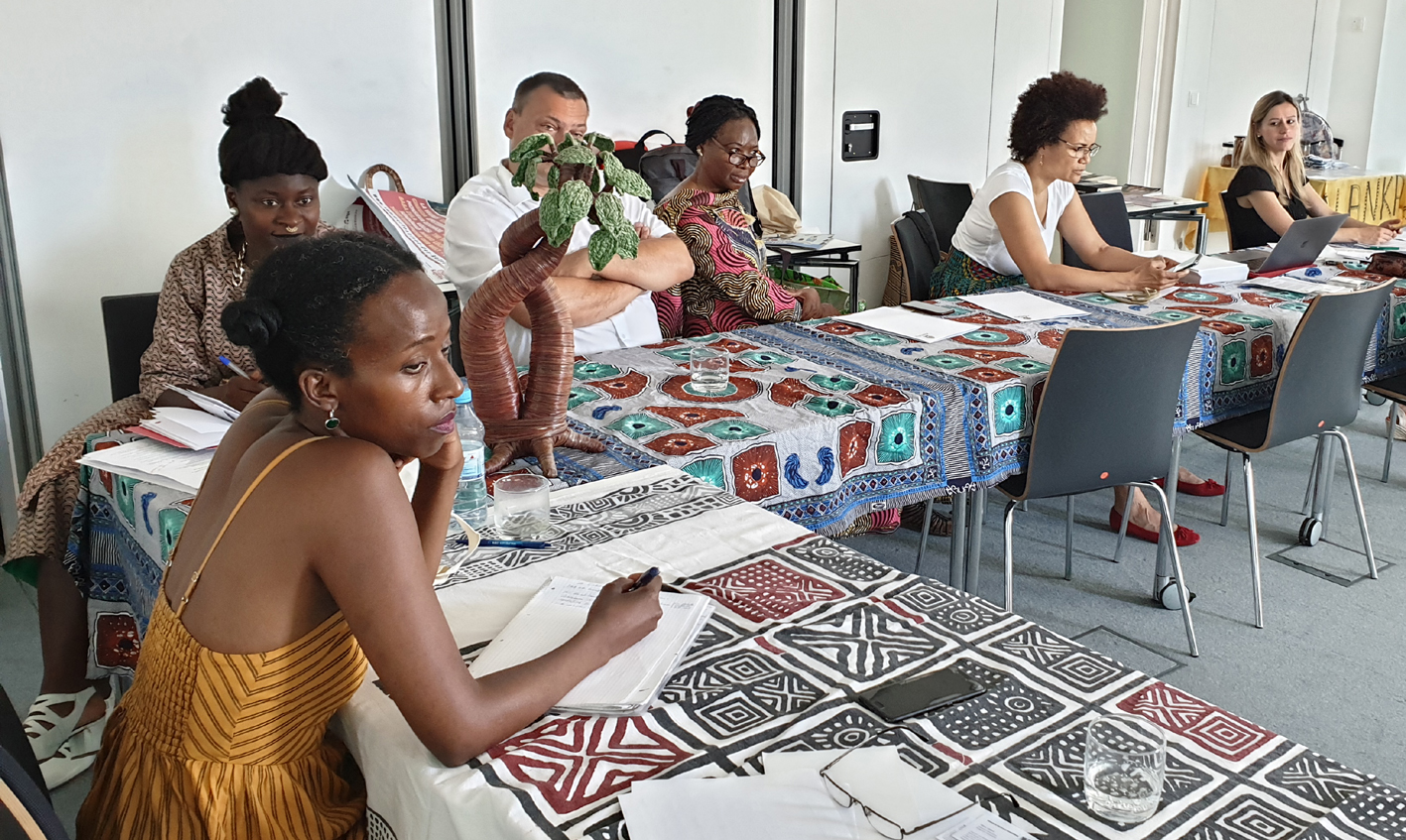
“It was here in the IHK Potsdam that we therefore decided that we African entrepreneurs from different countries had to come together and help one another,” she added. “It’s especially important for some of us who didn’t have the opportunities to found a business or become self-employed for some reasons.”
“We therefore approached the City of Potsdam for support because we believe that if all these potential African entrepreneurs were able establish businesses and thrive it would benefit the city.”
One of the aims of AfWiFo is to make information available to African women entrepreneurs in Germany and not only to those connected to the organisation.
“Another plank of our work with the IHK is to make sure that women who would like to be self employed can create their own company,” Ms Ballé added.
One of the achievements of the Forum’s activities is its advocacy for Africans without secure residency status who were able to secure jobs in the area. “For that we would like to thank these companies for giving our people the opportunity of employment,” she said.
Opportunities for African women
Olivia Liebert, advisor for international affairs at the IHK Potsdam, in her remarks, said some of the fastest growing economies in the world were in Africa and they offered opportunities for German companies. She said IHK was interested in working with African women entrepreneurs to bring products from the continent to the German market.
In her presentation, Dr Amina Tall, director of the Berlin office of the German-Arab Society, said the theme of the conference was apt as a recent study showed that 24% of women in Africa were self-employed, which is the highest self-employment rate for women in the world.
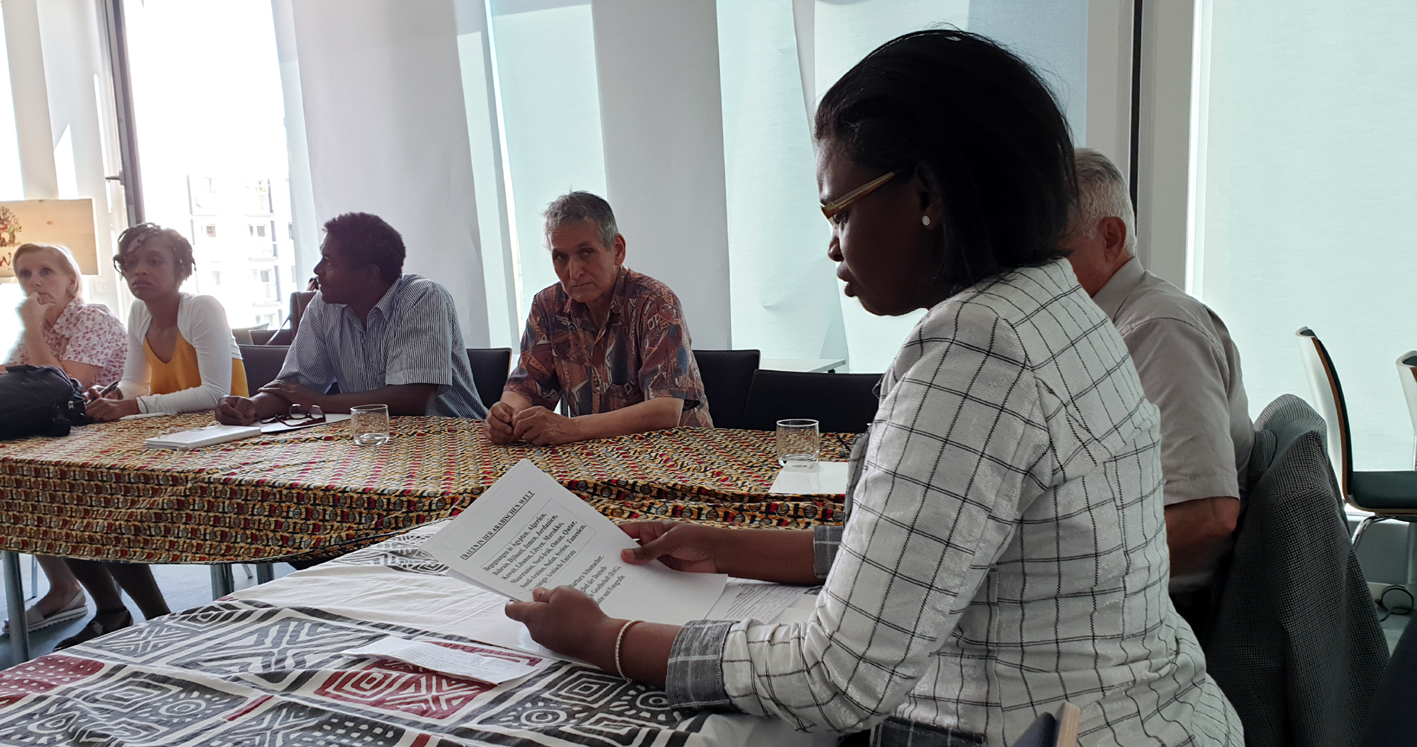
The economic opportunities were immense but so were the challenges, such as financing, preventing women from realising their potential as entrepreneurs, She noted.
Ms Tall, who was born in Burkina Faso, talked at length about support and financing opportunities available to female entrepreneurs. She named international organisations and development banks, such as
Germany’s Deutsche Investitions- und Entwicklungsgesellschaft (DEG), UK’s Department for International Development (DFID), International Finance Corporation (IFC), African Women’s Development Fund (AFWD), Wellcome Trust etc, offering financing, advice and support to women enterprises operating in developing and emerging-market countries.
She encouraged African women to explore the possibilities of partnering with these organisations for the realisation of their ventures.
For, Tall also pointed the attention of her audience to the ‘Compact with Africa’ initiative of Germany’s federal government and the opportunities it offers for African women entrepreneurs.
Seek information!
Max Renner of IHK Potsdam said municipal authorities were also interested in seeing people start businesses and succeed, advising anybody aspiring entrepreneurs should seek information related to their planned venture. “Educate yourself, all the information is out there,” he said.
In her contribution, Koko N´Diabi Affo-Tenin of the registered non-profit organisation Bildung für Balanka agreed that there were many advisory opportunities available in Germany, but the challenge was passing information about them to African women.
“Access to information is a major challenge,” she posited. “African women don’t trust their fellow Africans to seek information from them,” Affo-Tenin, who holds a Master’s degree in Business Administration, added. “This makes the issue complicated.”
Communicate with your MPs
A discussion session followed the speeches at which Herzberger-Fofana explained the position of her party, the Greens, on contemporary issues. She talked about her work as deputy chairman of the Committee for Development and member of the Committee for the Rights of Women and Gender Equality at the European Parliament.
The Green party was against the idea of Fortress Europe and support rescue missions in the Mediterranean, she explained. “All the parties except the neo-Nazis in the parliament want the deaths in the Mediterranean to stop,” she said. “We’re for a Nazi-free Europe which is why the first action we carried out in the parliament was to protest against neo-Nazi parties and groups.”
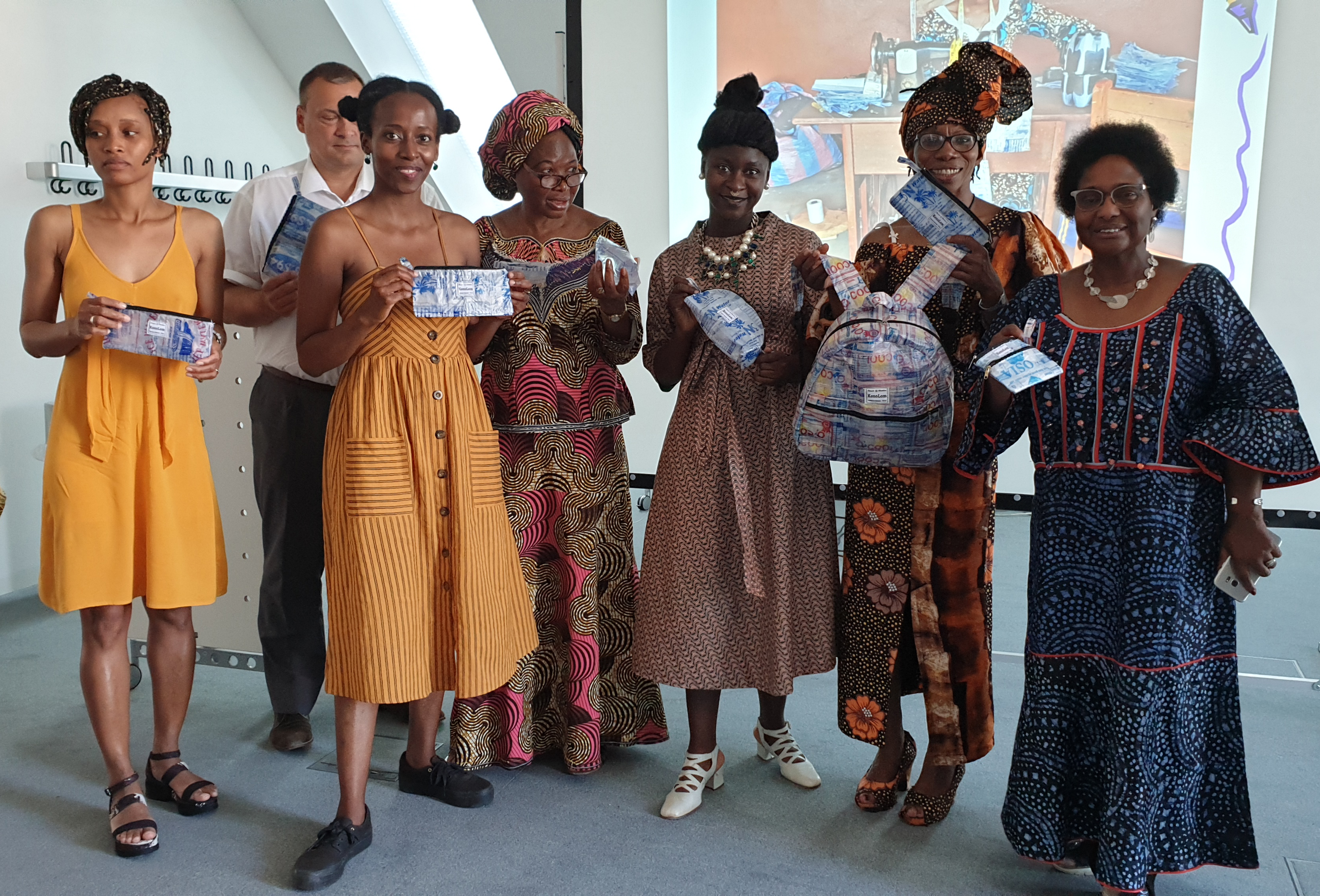
The parliamentarian explained that her party was in favour of the idea of a humanitarian visa scheme to enable labour migrants come to Europe to work and live a dignified life. “We support a rotational migration system,” she added.
The MP encouraged citizens to communicate with their representatives in the European Parliament. “It could be criticisms, suggestions or ideas. Make your views known to your MPs,” she advised.
Bring African products to German market
Cordine Lippert, head, Department of Climate Change in Potsdam, made a presentation on the activities of a city partnership programme between Potsdam and Zanzibar, Tanzania. She explained that such partnerships were a good way to promote know-how transfer – both ways, exchange experiences and promote the realisation of the UN’s Sustainable Development Goals.
Koko N´Diabi Affo-Tenin of Bildung für Balanka made a presentation on the work of her non-profit organisation, ranging from the construction of a library to the provision of solar power in the town of Balanka in Togo.
She displayed products made by women in Balanka from recycled water sachets under a project by her organisation to draw attention to the problem of plastic wastes and to promote recycling as one of the solutions to the problem.
The organisation’s Plan 2020 is a women agricultural project in the town, Ms Affo-Tenin revealed. The challenge she identified was finding a market for the products from such a project. Shea butter, Shea soap, soya cheese, cassava flour and moringa products are some of the things to be produced by the women.
The discussion that followed the presentation centred on how to make a business out of an idea. Brenner of the IHK said there was no simple answer because it’s a process.
He advised Affo-Tenin to contact the IHK as they offered free advice and counselling services. There were 97 chambers of commerce in Germany, he said.
Bert Wibel, advisor for Development Cooperation at IHK Potsdam, gave a brief lecture on the process of bringing products from abroad to the German market. He pointed to government-funded import promotion schemes, such as DeveloPPP, which support entrepreneurs to bring goods from some countries in Africa to the market in Germany.
Marianne Ballé Moudoumbou said women entrepreneurs should come together to help find markets for the Balanka agric project and mentors for a group of women entrepreneurs in the agricultural fields in various regions in Cameroon. She also advocated for the protection of the intellectual rights of communities and organisations such as the Namogo women weavers of Burkina Faso against patent filings by Western and Asian firms. In Germany and at European level, all political parties and coalitions should take sustainable development and the implementation of DDPA as a priority and state so in their programmes, she added.
Another project presented at the Day was a mentoring scheme to promote integration in the African community in Germany. Under “Vitamin P-Chancenpatenschaft im Übergang zwischen Schule & Beruf” (Vitamin P-Opportunity sponsorship in the transition between school and work), Hamidou Bouba explained how well-integrated members of the community help the less integrated through a mentoring system. Mr Bouba is from the migrant welfare organisation operating at federal level – Verband für interkulturelle Wohlfahrtspflege, Empowerment und Diversity e.V. (VIW). One of the project’s locations is PAWLO in Potsdam, in cooperation with Afrikanischer Kulturverein Palanca in Eberswalde, both for Brandenburg
In her concluding remarks, Ballé said PAWLO was working on developing a concept of establishing educational institutions as social enterprises in Africa. She reiterated her association’s continued commitment to the promotion of African women entrepreneurship in Germany.
Femi Awoniyi
 THE AFRICAN COURIER. Reporting Africa and its Diaspora! The African Courier is an international magazine published in Germany to report on Africa and the Diaspora African experience. The first issue of the bimonthly magazine appeared on the newsstands on 15 February 1998. The African Courier is a communication forum for European-African political, economic and cultural exchanges, and a voice for Africa in Europe.
THE AFRICAN COURIER. Reporting Africa and its Diaspora! The African Courier is an international magazine published in Germany to report on Africa and the Diaspora African experience. The first issue of the bimonthly magazine appeared on the newsstands on 15 February 1998. The African Courier is a communication forum for European-African political, economic and cultural exchanges, and a voice for Africa in Europe.













